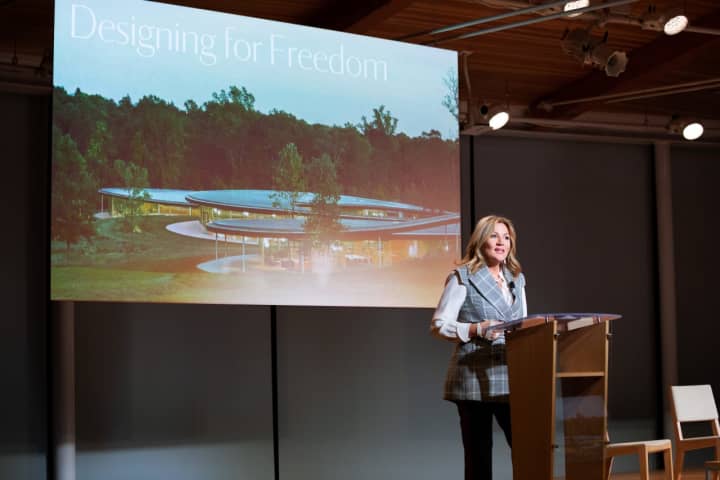Supply chain slavery is not a foreign problem. It may seem "out of our sight and reach, happening thousands of miles away," but homes and buildings everywhere, even in Fairfield County could have slave made materials, according to Sharon Prince, president and founder of Grace Farms Foundation in New Canaan.
The Foundation announced its initiative in September to raise awareness of the use of forced labor in the manufacture of building products, by forming The Architecture + Construction Working Group to eradicate modern slavery from the architecture and global construction industry.
The group is working to identify slave-free products to assist construction field professionals to avoid using materials made with forced labor.
Prince led a Nov. 15 panel discussion with former Ambassador Luis c.deBaca, senior justice initiative advisor to the Foundation, as a moderator. Panelists include building industry experts Nat Oppenheimer, principal and EVP of Robert Silman Associates and structural engineer for Grace Farms, and Hayes Slade, president of AIA New York and founding partner and principal of Slade Architecture.
They addressed the prevalence of slavery in the building materials supply chain and shared innovative, new frameworks that are being proposed to expose and dismantle exploitation in building supply chains.
“Grace Farms Foundation is committed to disrupting modern slavery worldwide and calling attention to its pervasive reach in the built environment,” said Prince.
“The use of slave labor in the architecture and construction industry is a multi-billion-dollar criminal industry, which is used to subsidize increased returns on investment. We aim to remove the imprint of slavery by creating a multi-channel movement that initiates a radical paradigm shift toward ethical building material supply chains in the design and construction sector, akin to the industry’s attention to the environment," she explained.
Prince said the global problem is felt locally, even in Fairfield County.
"Because we are a part of a complex, global economy, slave labor is prevalent in our supply chains. For example, most of us in Fairfield County and elsewhere look at buildings and don’t consider how, or with what materials, those buildings were constructed. But once we look closer and we know, we can’t unknow it," she said.
Forced labor and human trafficking is an estimated $150 billion industry worldwide. And even though modern slavery is illegal in every country, the State Department reports that building projects in more than 100 countries, including the U.S., have evidence of human trafficking, Prince said.
She said the Foundation's Designing for Freedom is a "first-of-its-kind initiative" to remove the imprint of slavery from the built environment.
"By understanding the problem, all of us have the ability to make choices that can drive meaningful change and help eradicate slavery.
"While this problem seems out of our sight and reach, happening thousands of miles away, slave-made materials are baked into our homes and local buildings, for generations to come."
Hard to trace slave-made building materials
"We have learned that once a project is built, it is extremely hard to trace materials back to their source to determine where they originated," said Prince.
"But once you understand how modern-day slavery is impacting the building supply chain, you can take a closer look at what you build with, from plywood for your backyard treehouse or new wood flooring for the inside of your home or materials used in major corporate headquarters and new building projects. There are numerous certification and reporting mechanisms that can help you examine your supply chain."
Grace Farms Foundation has resources on its website here to assist local builders and residents in selecting ethical materials. She said homeowners can talk to their builder before your project is underway to ensure you use materials that are slave-free.
Will the initiative impact lives?
"I believe it will. In individual and corporate capacities, we have the power to impact the building supply chain. We’ve seen the impact play out in consumer markets by making conscious buying decisions – from fashion to technology, by voicing your concerns to brands. So, as a global community member, professionally or individually, we certainly have an ethical obligation to alleviate the harm and brutality of modern slavery."
"In terms of construction, we now have the opportunity to extend this ethical decision-making, from on-site labor practices to the entire building supply chain including sub-contractors, manufacturers, and mining. So now we can consider our purchasing behavior and advocate for an ethical supply chain without forced labor. That a huge change. So, yes, I do believe, we can improve other lives and our lives knowing that we are not subsidizing and driving modern slavery."
The Framework for Freedom panel will convene in January, which is National Slavery and Human Trafficking Prevention Month, to discuss the critical role that public-private partnerships play in eradicating modern-day slavery.
The event will address the importance of collaboration between organizations and local and federal law enforcement in preventing, investigating, and prosecuting human trafficking crimes.
The free event takes place from 7:30 to 9 pm at Grace Farms, 365 Lukes Wood Road in New Canaan. Click here to register (required)
Click here to follow Daily Voice Bridgeport and receive free news updates.


